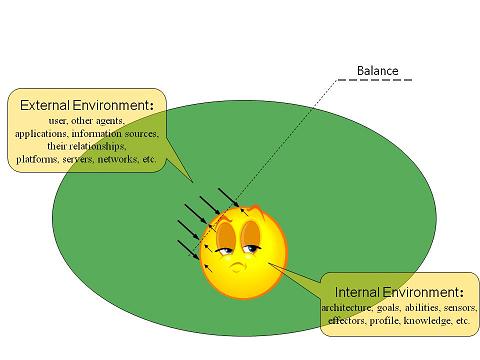Agent
American Heritage Dictionary defines agent as "one that acts or has the power or authority to act... or represent another...". In the AFECS context agent is a software abstraction of a control component of an integrated control system. It represents a control component in the AFECS platform. A software agent has a following characteristics shown in this cartoon.

Intelligent agent is an entity that is able to keep continuous balance between its internal and external environments in such a way that in the case of an imbalance an agent can change external environment to achieve required (programmed) balance with its' internal environment. In this case agent will demonstrate its creative nature.

The required balance can be achieved also by agent changing its' internal state to be in the equilibrium with the agents external environment. In this case we say that the agent is adaptive. In some cases it would be more appropriate to achieve internal and external environment equilibrium by simple moving to another external environment, where agent will find total balance or much easier balancing effort. This is the case when agent is considered to be a mobile agent. Agents can also communicate with one another, and create a community of agents that will use the help of other agents in the community to satisfy their individual internal/external environment balancing requirements. In this case agent will demonstrate social characteristics. An agent also can be programmed to demonstrate learning abilities. It is important to mention that by introducing these characteristics for agents and agent systems the designer must develop and agent that is trustworthy, meaning the it will not knowingly provide false information to its user, and will not have conflicting goals, and therefore agent will always try to do what it was asked for. Agents of the AFECS platform act in order to achieve their control objectives and will not act in such a way to prevent the system goal being achieved.



